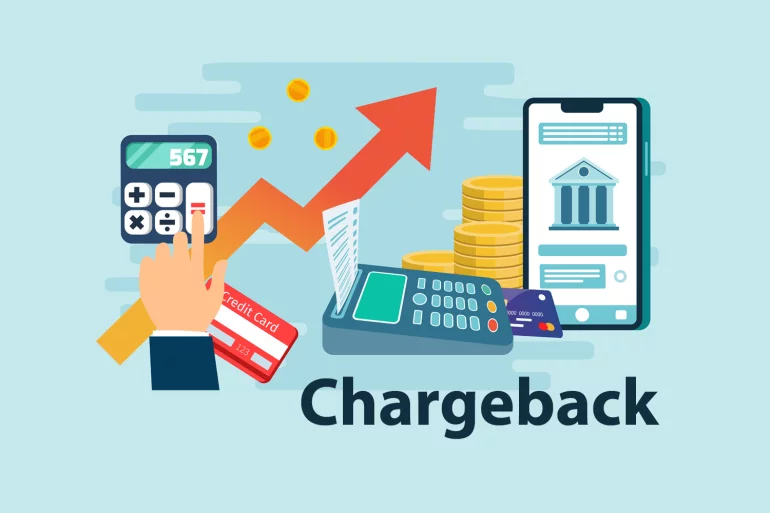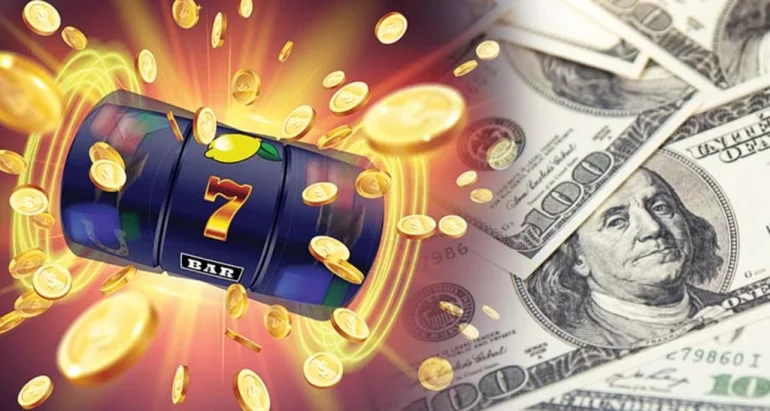
Chargeback is a term that is becoming increasingly relevant in the world of online casinos, raising many questions for both players and gaming platform operators.
In virtual gambling, a chargeback is a process whereby players apply to their bank or credit card company to recover funds spent on a game.
This process has its peculiarities and consequences for both players and casinos.
In this article, we will look at the concept of chargeback in online casinos in more detail, examine its implementation, and consider the possible consequences for all parties involved. From the importance of understanding what chargeback is and how it works to strategies to prevent and protect against unwanted effects, we will attempt to provide a comprehensive look at the topic to help players and casinos better understand this vital aspect of online gambling.
The Concept of Chargeback
Chargeback is a refund process initiated by a customer through their bank or credit card company.<
This mechanism protects consumers from abusive transactions, fraud, or unintentional chargebacks. It plays a significant role in the financial industry by ensuring customer confidence in payment systems and reducing the risks of unwanted financial consequences.

In online casinos, a chargeback can occur when a player believes that their money has been debited from their account without their consent or as a result of fraud. This can happen for various reasons, such as:
- Fraudulent transactions: If a player discovers transactions on their account that they did not make, this could be a sign that their credit card has been compromised and used for deceitful transactions at an online casino. In this case, the player has the right to apply for a chargeback to recover the funds spent on these transactions.
- Technical problems: If technical glitches or errors occur during the game, resulting in the wrongful debiting of funds from the player's gaming account, the player may request a chargeback. For example, it may be an erroneous double debit or problems with the payment system.
- Dissatisfaction with the quality of services: If a player believes that the online casino services were provided poorly or did not meet expectations, he can apply for a chargeback. For example, if the player believes that the results of a game have been manipulated, this has resulted in a loss of funds.
- Refusal of service: If a player accidentally makes a transaction or changes their mind after making a payment, they may attempt to request a chargeback. The internet casino chargeback process involves the player contacting their bank or credit card company to request a refund and providing appropriate evidence. Depending on the review's outcome, the funds may be returned to the player or rejected by the bank or payment processor.
It should be understood that chargeback is a mechanism designed to protect consumers from illegal transactions or fraud. However, if abused, it can also be used to obtain a refund improperly.
What Does the Chargeback Process Look Like Step by Step?
The step-by-step process of a player requesting a refund from a bank or credit card company includes the following actions:
- Preparing evidence: The player gathers all the necessary evidence to support all claims of wrongful debit from the online casino account. This can be screenshots of the transaction confirmation, emails or chats with customer support, and any other information that proves the claims.
- Drafting a chargeback request: The player drafts a formal chargeback request providing the transaction details, the amount of funds, the date and time of the transaction, and all the evidence collected. This request can be written in an email or filled in a form from the bank or payment system.
- Sending the request to the bank or credit card company: The player sends the request for a chargeback to the bank or credit card company. This can be done through online banking, email, or a specialized section on the bank's website.
- Waiting for the request to be processed: After sending the request, the player waits for his case to be processed. Additional evidence or information may be required during this time.
- Deciding on the request: After an investigation, the bank or credit card company decides whether to approve or deny the chargeback. The player is notified of the decision, and if approved, the funds are returned to the account.
- Maintaining contact: If necessary, the player retains contact with the bank or credit card company, provides additional information or documents upon request, and follows up on the progress of the investigation.
What Documents and Evidence May Be Required from the Player?
When a player contacts a bank or credit card company with a request for a Chargeback in an online casino context, they may be required to provide certain documents and evidence to support their claim. Here are some of the possible papers and evidence that may be needed:
- Screenshots of the screen: Screenshots of an online casino transaction confirmation screen can prove that funds have been debited from the player's gaming account.
- Emails or chats: If a player has communicated with casino customer support representatives via email or chat, they can provide copies of the correspondence as proof of their claims.
- Account statements: Bank or credit card statements for the bank account or credit card used for the transaction at the casino can confirm the fact that the funds were debited and the transaction amount.
- Screenshots of bank transactions: A player can provide screenshots of bank transactions showing transactions with the online casino to prove that their account was debited.
- Other documents: Depending on the specific situation, the bank or credit card company may require additional documents or information for a more detailed case review.
The player must provide all available evidence and information to increase the chances of a successful resolution of the case in his favor. The more complete and convincing the evidence provided, the more likely a favorable decision on the chargeback request will be obtained.
How Do Casinos Respond to Chargeback Claims?
When a casino receives a chargeback request from a player or a notice of a potential dispute from a bank or credit card company, it usually takes the following steps in response:
- Verifying the transaction: The casino analyzes its records to verify the transaction and establish its legitimacy. This may include verifying the player's gaming history, confirming the date and time of the transaction, and other details.
- Providing evidence: The casino can give the bank or credit card company all the necessary documents and information to prove the legitimacy of the transaction and the absence of fraud. This may include game data, chats with customer support, transaction logs, and other documents.
- Player communication: In some cases, the casino may attempt to contact the player to clarify the details of the dispute and offer an alternative solution. This may include offering a refund or compensation through bonuses or discounts on future games.
- Dispute Review: The casino is actively involved in the dispute review process by the bank or credit card company. It provides all the necessary evidence and arguments in its defense to convince the party of the transaction's legitimacy.
- Decision Making: After the parties have reviewed the dispute, the bank or credit card company decides whether to refund the player or deny the request for a Chargeback. The casino agrees to honor the decision made by the bank or credit card company and refund the funds to the player, if applicable.
An online casino's response to requests for a сhargeback can vary depending on the specific situation and the policies set by the company. Some casinos may have more generous policies regarding refunds, while others may be more strict in following established policies and procedures.
You will never need chargeback if you gamble at reliable online casinos.
Financial and Reputational Implications for Casinos if a Chargeback Is Successful
- Financial Loss: A successful chargeback means the casino must return the funds to the player. This can lead to unforeseen financial losses, especially if large amounts are involved. In addition to returning the funds to the player, the casino must also pay fines or fees to the bank or payment processor for handling the case.
- Loss of reputation: A successful chargeback can hurt a casino's reputation. Players and potential customers may perceive such an event as a sign of the casino's lack of reliability or honesty. This can lead to a loss of trust from players and reduce their interest in long-term cooperation.
- Deterioration of the relationship with the bank or payment system: Successive cases of successful chargebacks may lead to deterioration of the casino's relationship with the bank or payment system. Banks and payment systems may begin to view the casino as a risky partner and take appropriate measures, such as increasing fees or restricting the use of their services.
- Loss of player trust: Successful chargebacks can cause players to doubt the honesty and reliability of the casino. This can lead to losing player confidence in the casino, decreased player activity, and customer churn to competitors.
- Increased risk of fraud: Successful chargebacks may encourage fraudsters and unscrupulous players to use this mechanism to obtain undeserved benefits. This can increase the risk of fraud and cause additional financial losses to the casino.
A successful chargeback can have severe financial and reputational consequences for a casino, so gaming clubs always take measures to minimize risks and effectively manage disputes with players.
How Do Casinos Protect Themselves from Unwanted Chargebacks?
Casinos take many measures to protect themselves from unwanted chargebacks and minimize the risks. Here are the main ways casinos defend themselves:
- Security and Privacy Policies: The casino follows high standards for protecting its customers' data. This includes data encryption, multi-factor authentication, and other technologies to prevent unauthorized access to players' personal information and financial data.
- Transaction Monitoring: The casino continuously monitors financial transactions to detect suspicious or anomalous transactions. This allows for the timely detection and prevention of fraudulent activities and unwanted transactions.
- Internal checks and balances: The casino establishes internal procedures and controls to verify the legitimacy of transactions and operations. This includes authenticating gaming sessions, analyzing and auditing gaming data, and monitoring player activity.
- Terms and Conditions: The casino develops and clearly defines the terms and conditions of use of its services, including refund and dispute procedures. This allows the casino to have clear rules that players agree to when registering and agreeing to use the services.
- Collaboration with payment systems: The casino maintains close relationships with payment systems and banks to ensure a high level of security and efficient management of financial transactions. This includes compliance with PCI DSS (Payment Card Data Security Standard), cooperation with anti-fraud services, and other measures.
- Staff training: The casino trains its staff to be competent in detecting and preventing fraudulent activities and unwanted transactions. This helps increase the staff's awareness and competence in security and data protection issues.
Each casino develops its strategies and policies to protect against unwanted chargebacks, considering the specifics of its operations and market conditions.

Strategies to Minimize the Risk of Chargeback for Players and Casinos
Developing strategies to minimize the risks of chargeback is a crucial aspect for both players and casinos.
For players:
- Financial management: Players should develop a strategy to manage their finances to avoid situations that could lead to a chargeback. This includes setting deposit limits, monitoring bank details, and keeping track of funds spent.
- Careful review of terms and conditions: Players should carefully study the casino's terms and conditions of use to understand their rights and obligations in case of disputes. This will help them make informed decisions and avoid unforeseen situations.
- Seeking help in disputes: If a player has a problem with a transaction or other contentious situation, they should contact the casino's customer support team to resolve the issue before a chargeback. This can help avoid unnecessary conflicts and settle disputes amicably.
For casinos:
- Develop transparent terms and conditions: A casino should develop clear and transparent terms and conditions for using its services to avoid misunderstandings and disputes with players. This will prevent possible situations that could lead to a chargeback.
- Staff training: Casino staff should be adequately trained and informed about refund and dispute procedures and policies. This will help them to manage disputes effectively and prevent unwanted chargebacks.
- Transaction monitoring and analysis: The casino should constantly monitor financial transactions and analyze the data to identify potential issues and fraud risks. This will help in responding to abusive transactions promptly and preventing potential chargebacks.
Overall, developing a strategy to minimize the risks of chargebacks is an essential step for players and casinos. It allows both parties to manage potential problems and conflicts, contributing to a smoother and more efficient online gambling experience.
The Laws Governing the Chargeback in Various Jurisdictions
- USA: The Fair Credit Billing Act regulates the process of chargeback and refunds in the case of abusive credit card transactions.
- European Union: The European Union Payment Services Directive (PSD2) - sets out rules for payment services and obligations in case of disputed transactions.
- United Kingdom: The Payment Services Regulations control the rules for payment transactions and obligations in case of a chargeback.
- Canada: The Consumer Credit Protection Act defines the rights and obligations of consumers in the event of abusive credit card transactions.
- Australia: The Consumer Credit Law establishes the rules and obligations for credit organizations and consumers in the event of disputed transactions.
These are just general examples of some laws and regulations governing the Chargeback process in various jurisdictions. It is advisable to contact local regulators and legal advisors for more detailed information as needed.
Conclusions about Chargeback at Online Casinos.
- Importance of chargeback: Chargeback protects players' interests at online casinos. It allows players to apply for a refund in case of wrongful debit or other transaction problems.
- Implications for the casino: Successful chargebacks can have severe financial and reputational consequences for the casino. It can lead to losing player trust, decreased loyalty, and negatively impacted brand reputation.
- Casino's protective measures: The casino takes some measures to protect against unwanted chargebacks, including monitoring transactions, setting security policies, training staff, and cooperating with payment processors.
- Player Perception: Chargebacks can be a stressful and unpleasant experience for players, but they also give them a sense of security and protection of their rights. A successful chargeback can increase players' confidence in the casino and raise questions about its reliability.
Overall, a chargeback is crucial to ensuring fairness and security in online casinos. This process requires careful management by the casino and a clear understanding on the part of players to minimize risks and ensure a positive experience for everyone involved in the gaming process.














